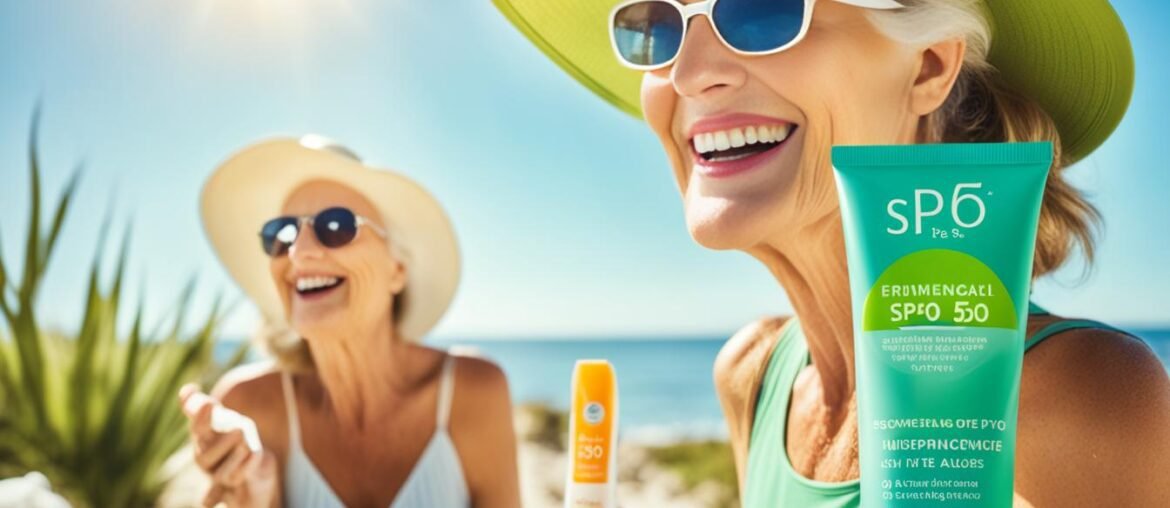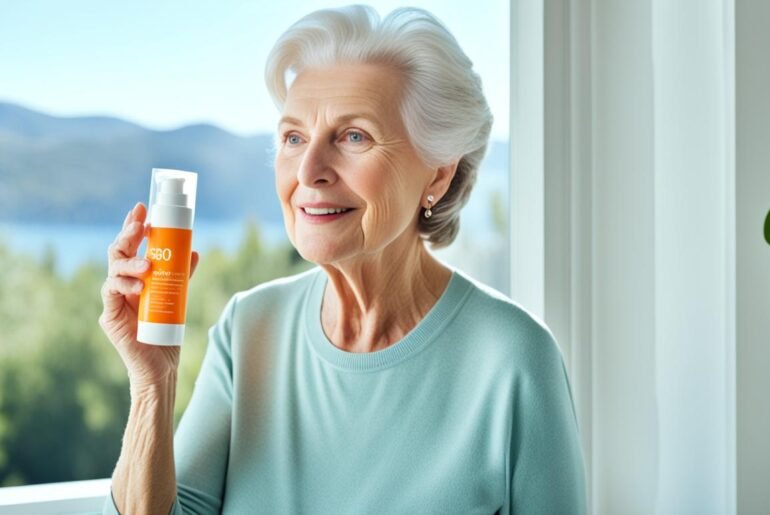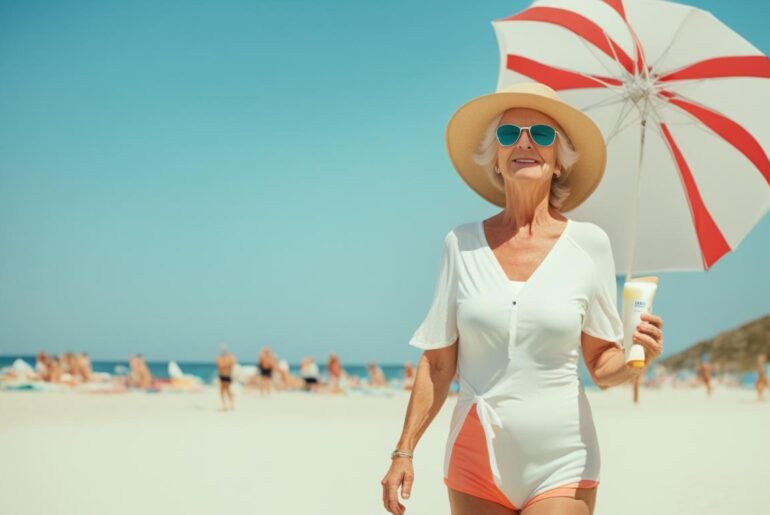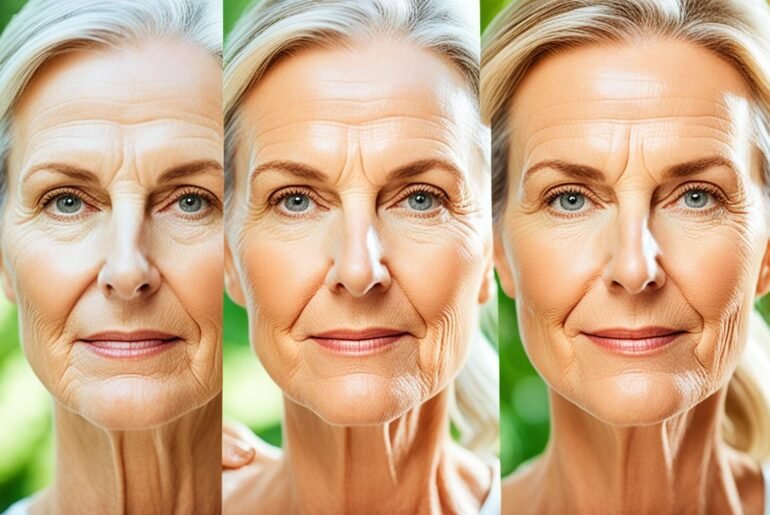Did you know that up to 80% of skin changes associated with aging are caused by the sun’s relentless UV rays? That’s right, the very same sun that brings warmth and light to our lives can also wreak havoc on our skin. But fear not, because I’m here to reveal the secret to preserving your youthful complexion and minimizing the signs of aging: sunscreen.
Sunscreen is not just a defense against sunburn and skin cancer; it also plays a crucial role in preventing premature aging. By incorporating specific sunscreen ingredients into your skincare routine, you can shield your skin from the harmful effects of the sun and maintain a radiant, youthful appearance for years to come.
Key Takeaways:
- Up to 80% of skin changes associated with aging are caused by the sun’s UV rays.
- Sunscreen is essential for protecting aging skin from hyperpigmentation, age spots, and skin cancer.
- Look for sunscreen ingredients like zinc oxide, avobenzone, antioxidants, niacinamide, green tea extract, hyaluronic acid, alpha-lipoic acid, ceramides, and coenzyme Q10 for optimal anti-aging benefits.
- Choose a sunscreen with a minimum SPF of 30 for daily use and SPF 50 for extended outdoor activities.
- Consider your skin type and sensitivity when selecting an anti-aging sunscreen.
Understanding How UV Rays Damage the Skin
UV rays, both UVA and UVB, can cause cellular damage to the skin. UVB rays primarily affect the top layer of the skin, leading to redness, roughness, and scaly patches known as actinic keratosis. UVA rays, on the other hand, can penetrate deeper into the skin, damaging the collagen and elastin fibers that give skin its firmness and elasticity. This damage can result in wrinkles, fine lines, and sagging skin.
The harmful effects of UV rays are not limited to cosmetic concerns. Prolonged exposure to these rays can lead to more serious conditions such as skin cancer. UVB rays are responsible for sunburns and can directly damage the DNA in skin cells. UVA rays, although less intense, can still cause DNA damage and contribute to the development of skin cancer over time.
The Impact of UV Rays on Keratinocytes
Keratinocytes, the most common type of skin cells, play a crucial role in protecting the skin from external factors. However, they are also susceptible to damage from UV rays. When exposed to UVB rays, keratinocytes undergo changes that can lead to the development of actinic keratosis, a precancerous condition. Over time, these damaged cells may progress to become squamous cell carcinoma, a type of skin cancer.
UVA rays can penetrate deeper into the skin, reaching the dermis where collagen and elastin fibers are found. These rays can directly damage the DNA of keratinocytes in the basal layer of the epidermis, leading to mutations that can contribute to the development of skin cancer.
“UV rays pose a significant threat to the health and appearance of the skin. Understanding how these rays damage the skin is crucial for taking appropriate measures to protect ourselves.”
It is important to note that UV rays can still reach the skin even on cloudy days or when you’re indoors near windows. Therefore, protecting your skin from UV damage should be a priority year-round, regardless of the weather or your location.
To further illustrate the effects of UV damage on the skin, consider the following table:
| UV Rays | Effects on the Skin |
|---|---|
| UVB | – Redness and inflammation – Actinic keratosis (scaly patches) – Sunburns – Increase the risk of skin cancer |
| UVA | – Collagen and elastin breakdown – Wrinkles and fine lines – Sagging skin – Increase the risk of skin cancer |
As the table demonstrates, both UVB and UVA rays can cause significant damage to the skin, from superficial cosmetic concerns to potentially life-threatening conditions.
The Importance of Sunscreen for Aging Skin
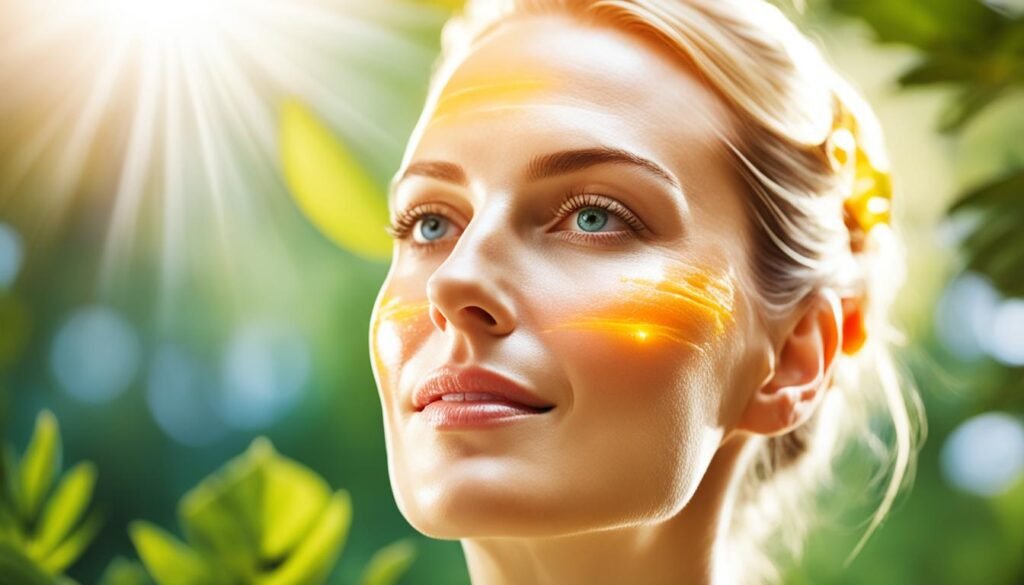
Aging skin requires special care and protection from the sun’s harmful rays. Prolonged sun exposure can accelerate the aging process, leading to a variety of skin concerns such as hyperpigmentation, age spots, uneven skin tone, and even skin cancer. To prevent these issues and maintain a youthful appearance, it is crucial to incorporate a high-quality sunscreen into your daily skincare routine.
By consistently wearing sunscreen, you can shield your skin from the damaging effects of UV radiation. Sunscreen acts as a barrier, preventing the sun’s harmful UVA and UVB rays from penetrating the skin and causing damage. This protection is essential for preventing premature aging and maintaining a healthy complexion.
To truly understand the importance of sunscreen for aging skin, let’s take a closer look at the harmful effects of sun exposure:
- Sun Damage: The sun’s UV rays can cause significant damage to the skin, whether it is a few minutes or several hours of exposure. Over time, this damage accumulates and manifests as signs of aging such as wrinkles, fine lines, and sagging skin.
- Hyperpigmentation: Excessive sun exposure can lead to the production of excess melanin, resulting in dark spots and uneven skin tone. These pigment-related concerns can make the skin appear older and less vibrant.
- Age Spots: Also known as liver spots or solar lentigines, age spots are flat, tan, or brown spots that appear on sun-exposed areas of the skin. These spots can give the skin an aged appearance.
- Skin Cancer: Prolonged sun exposure is a leading cause of skin cancer. Skin cancers such as basal cell carcinoma, squamous cell carcinoma, and melanoma can develop as a result of cumulative sun damage over time.
By using sunscreen daily, you can prevent these common signs of aging and protect your skin from harmful UV radiation. The key is to choose a broad-spectrum sunscreen with a high SPF (Sun Protection Factor) that effectively blocks both UVA and UVB rays.
“Prevention is key when it comes to sun damage and aging skin. Regular use of sunscreen can significantly reduce the risk of premature aging and protect the skin’s overall health and appearance.”
Make sunscreen application a habit in your skincare routine, not just during the summer months but year-round. Apply sunscreen liberally to all exposed areas of the body, including the face, neck, hands, and any other areas prone to sun exposure. Reapply every two hours, or more frequently if you are sweating or swimming.
The Benefits of Sunscreen for Aging Skin:
| Benefits | Explanation |
|---|---|
| Protection from UV Rays | Sunscreen acts as a shield, preventing harmful UVA and UVB rays from damaging the skin. |
| Prevention of Premature Aging | By reducing sun damage, sunscreen helps minimize the appearance of wrinkles, fine lines, and sagging skin. |
| Even Skin Tone | Sunscreen helps prevent hyperpigmentation, age spots, and uneven skin tone, promoting a more youthful complexion. |
| Reduced Risk of Skin Cancer | Regular use of sunscreen significantly lowers the risk of developing skin cancer caused by sun exposure. |
Investing in a high-quality sunscreen specifically formulated for aging skin is essential for long-term skin health and maintaining a youthful appearance. Remember, prevention is always better than correction when it comes to skincare.
Key Anti-Aging Ingredients in Sunscreen
When it comes to choosing an anti-aging sunscreen, it’s essential to look for specific ingredients that not only provide sun protection but also offer skin benefits. These key ingredients work together to safeguard your skin from harmful UV rays while nourishing and rejuvenating it.
Zinc Oxide and Avobenzone
Zinc oxide and avobenzone are two prominent sunscreen ingredients that provide broad-spectrum protection against both UVA and UVB rays. Zinc oxide physically blocks the sun’s rays, acting as a barrier on the skin’s surface, while avobenzone absorbs and helps to dissipate UV radiation.
Antioxidants
Antioxidants such as green tea extract neutralize free radicals caused by sun exposure, preventing oxidative stress and reducing the signs of aging. These powerful compounds help protect your skin from damage and promote a youthful complexion.
Niacinamide
Niacinamide, a form of vitamin B3, is a versatile ingredient that offers multiple benefits for aging skin. It improves skin elasticity, reduces the appearance of wrinkles, and helps maintain the skin’s moisture barrier. Niacinamide also supports skin’s natural repair processes, keeping it healthy and youthful.
Hyaluronic Acid
Hyaluronic acid is a hydrating powerhouse that helps retain moisture in the skin. As we age, our skin’s natural hyaluronic acid levels decrease, leading to dryness and wrinkles. By using a sunscreen with hyaluronic acid, you can replenish moisture levels and maintain a plump, youthful complexion.
Alpha-Lipoic Acid
Alpha-lipoic acid is both an antioxidant and an anti-inflammatory ingredient. It helps to reduce skin inflammation caused by sun exposure and environmental stressors. Alpha-lipoic acid also neutralizes free radicals, protecting the skin against premature aging.
Ceramides
Ceramides are essential lipids found naturally in the skin. They play a vital role in maintaining the skin’s moisture barrier, preventing water loss and promoting hydration. Sunscreen enriched with ceramides helps to retain moisture, keeping the skin smooth and youthful.
Coenzyme Q10
Coenzyme Q10 is a potent antioxidant that helps to reduce the signs of aging. It protects the skin from oxidative stress caused by sun exposure and boosts collagen production, promoting firmer, more elastic skin.
By choosing an anti-aging sunscreen that contains these key ingredients, you can ensure your skin is not only protected from UV rays but also nourished and rejuvenated. Incorporate these powerful ingredients into your daily skincare routine to maintain a youthful and radiant complexion.
Extra Tips for Choosing an Anti-Aging Sunscreen
When it comes to selecting an anti-aging sunscreen, there are a few extra tips to keep in mind. These tips will help you make an informed decision and choose a sunscreen that provides optimal protection for aging skin.
1. Consider the SPF Value
SPF, or Sun Protection Factor, is an essential factor to consider when choosing an anti-aging sunscreen. For daily use, a minimum SPF of 30 is recommended to protect against the sun’s harmful rays. However, if you plan on spending an extended amount of time outdoors, such as during outdoor activities or vacations, opt for a high SPF of 50 or more.
2. Choose the Right Type of Sunscreen
There are two main types of sunscreens: chemical sunscreens and mineral sunscreens. Chemical sunscreens contain active ingredients that absorb UV radiation, while mineral sunscreens use physical blockers like zinc oxide and titanium dioxide to reflect and scatter UV rays.
If you have sensitive skin, mineral sunscreens are generally gentler and less likely to cause irritation. They are also considered a safer option since they provide broad-spectrum protection without the use of potentially harmful chemicals.
3. Avoid Oxybenzone and Octinoxate
When reading the sunscreen labels, it’s important to check for oxybenzone and octinoxate. These are chemical filters that have raised concerns due to their potential harm to coral reefs and their potential for allergic reactions in some individuals.
Did you know? Oxybenzone and octinoxate have been banned or restricted in certain regions to protect coral reef ecosystems. By choosing sunscreens without these ingredients, you can make a positive impact on the environment while protecting your skin.
By following these extra tips, you can confidently choose an anti-aging sunscreen that offers effective sun protection and meets your skin’s specific needs.
| Type of Sunscreen | SPF Range | Pros | Cons |
|---|---|---|---|
| Chemical Sunscreen | Various options | – Absorbs UV radiation – Lightweight and easy to apply – Often blends well with makeup |
– May cause skin irritation in some individuals – Some ingredients may have environmental concerns |
| Mineral Sunscreen | Various options | – Reflects and scatters UV rays – Gentle on sensitive skin – Less likely to cause irritation – Usually safer for the environment |
– Can leave a white cast on the skin if not blended properly – May feel heavier on the skin |
Remember, finding the right anti-aging sunscreen is essential for protecting your skin from sun damage and maintaining a youthful appearance. Consider the SPF value, type of sunscreen, and the ingredients to avoid, and you’ll be on your way to healthier, more radiant skin.
Who Should Use Anti-Aging Sunscreen
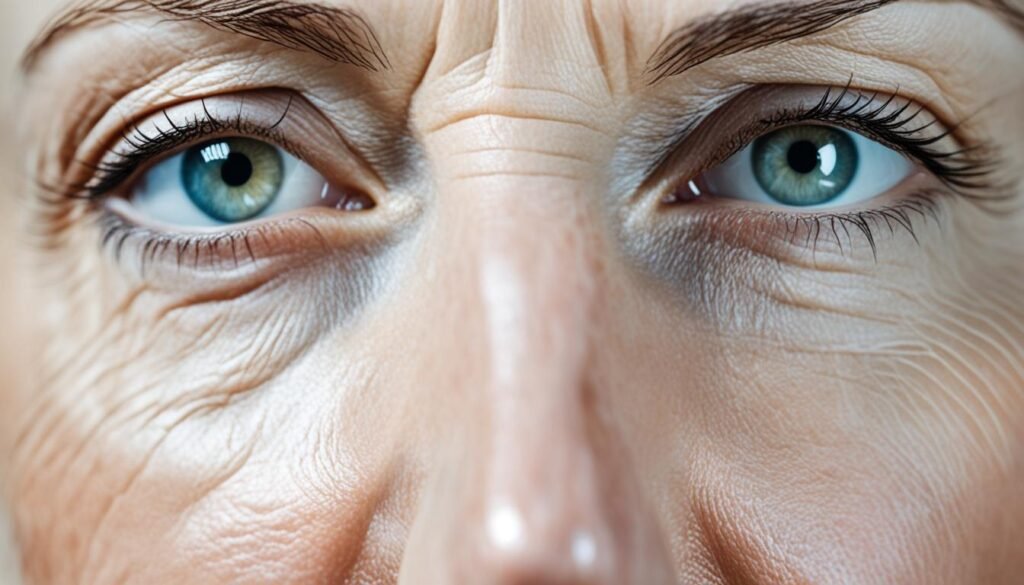
Anti-aging sunscreen is suitable for individuals of all ages, from mature adults who want to maintain skin elasticity and prevent further signs of aging to young adults who wish to delay signs of aging. It is also ideal for those with sensitive skin, as many anti-aging sunscreens contain soothing ingredients that protect without causing irritation.
| Who Should Use Anti-Aging Sunscreen | Benefits |
|---|---|
| Mature Adults | Preserves skin elasticity Prevents further signs of aging Reduces the appearance of wrinkles and fine lines |
| Young Adults | Delays signs of aging Maintains a more youthful complexion Prevents sun damage |
| Sensitive Skin | Provides protection without irritation Soothes and calms the skin Reduces redness and inflammation |
So whether you have mature skin, sensitive skin, or simply want to preserve your youthful appearance, incorporating anti-aging sunscreen into your daily skincare routine is a wise choice.
Best Anti-Aging Sunscreen for the Face
When it comes to protecting your face from the harmful effects of the sun while combatting signs of aging, KAHI’s Wrinkle Bounce Essential Suncream is an exceptional choice. With its powerful blend of ingredients, this sunscreen offers broad-spectrum protection and nourishment for a youthful complexion.
KAHI’s Wrinkle Bounce Essential Suncream contains two key ingredients for effective sun protection: zinc oxide and titanium dioxide. These mineral-based compounds act as physical barriers, reflecting and scattering harmful UV rays away from the skin. This helps to prevent sunburn, hyperpigmentation, and other signs of sun damage.
In addition to its sun-shielding properties, this sunscreen is enriched with niacinamide. Niacinamide, also known as vitamin B3, has been scientifically proven to improve skin elasticity and reduce the appearance of wrinkles and fine lines. By incorporating niacinamide into its formulation, KAHI’s Wrinkle Bounce Essential Suncream not only protects your skin from the sun but also helps to revitalize and rejuvenate it.
One of the unique features of this sunscreen is its cream-type texture. Unlike traditional sunscreens that may leave a white cast or feel heavy on the skin, the lightweight and easily absorbed formula of KAHI’s Wrinkle Bounce Essential Suncream provides a smooth and comfortable application. It replenishes nutrition and moisture to the skin, leaving it hydrated, supple, and youthful-looking.
Give your face the protection and care it deserves with KAHI’s Wrinkle Bounce Essential Suncream. Shield your skin from the sun’s harmful rays and improve its overall health and appearance with this advanced anti-aging sunscreen.
Benefits of KAHI’s Wrinkle Bounce Essential Suncream:
- Broad-spectrum sun protection with zinc oxide and titanium dioxide
- Niacinamide improves skin elasticity and reduces wrinkles
- Cream-type texture for lightweight and comfortable application
- Nourishes and moisturizes the skin, reducing the appearance of wrinkles
How to Use:
- Apply KAHI’s Wrinkle Bounce Essential Suncream as the last step of your skincare routine.
- Dispense an adequate amount and apply evenly over your face and neck.
- Massage gently until fully absorbed.
- Reapply every two hours and after swimming or sweating for maximum sun protection.
Best Anti-Aging Sunscreen for Sensitive Skin
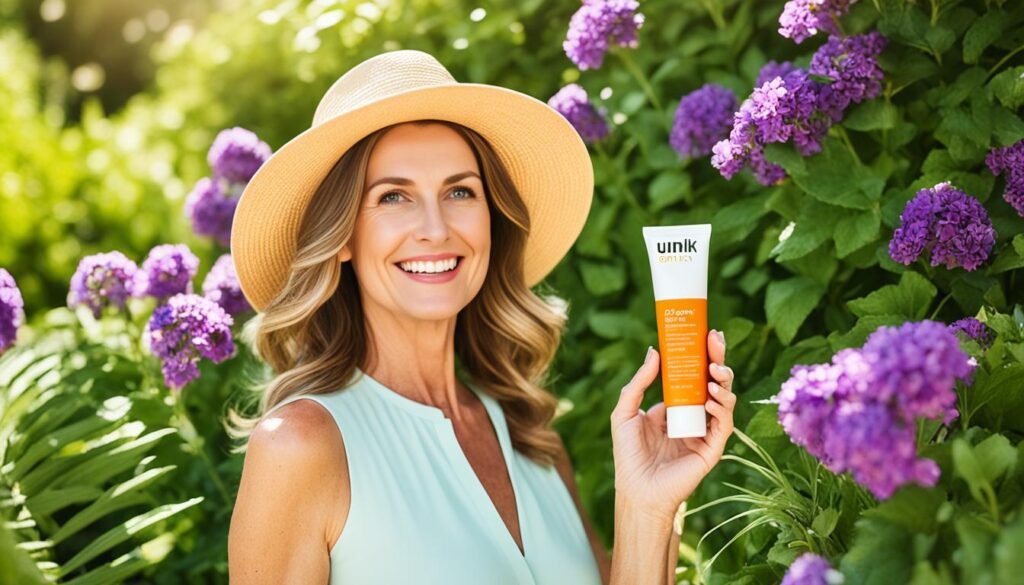
Sensitive skin requires extra care when it comes to sun protection. The iUNIK Centella Calming Daily Sunscreen is the ideal choice for those with sensitive skin seeking effective anti-aging benefits. This sunscreen offers SPF 50+ PA++++ protection, ensuring comprehensive defense against harmful UV rays.
The key ingredients in this sunscreen are Centella Asiatica Extract and Beta-Glucan, which work synergistically to nourish and protect sensitive skin. Centella Asiatica Extract is renowned for its anti-aging properties, aiding in collagen production and reducing the appearance of fine lines and wrinkles. Beta-Glucan provides hydration, soothing properties, and helps calm skin irritation, making it particularly suitable for sensitive skin types.
With its lightweight and non-irritating formula, the iUNIK Centella Calming Daily Sunscreen is gentle on the skin while delivering superior sun protection. Incorporating it into your daily skincare routine will not only shield your sensitive skin from harmful UV rays but also contribute to maintaining a youthful and healthy complexion.
Best Anti-Aging Sunscreen for Oily and Combination Skin
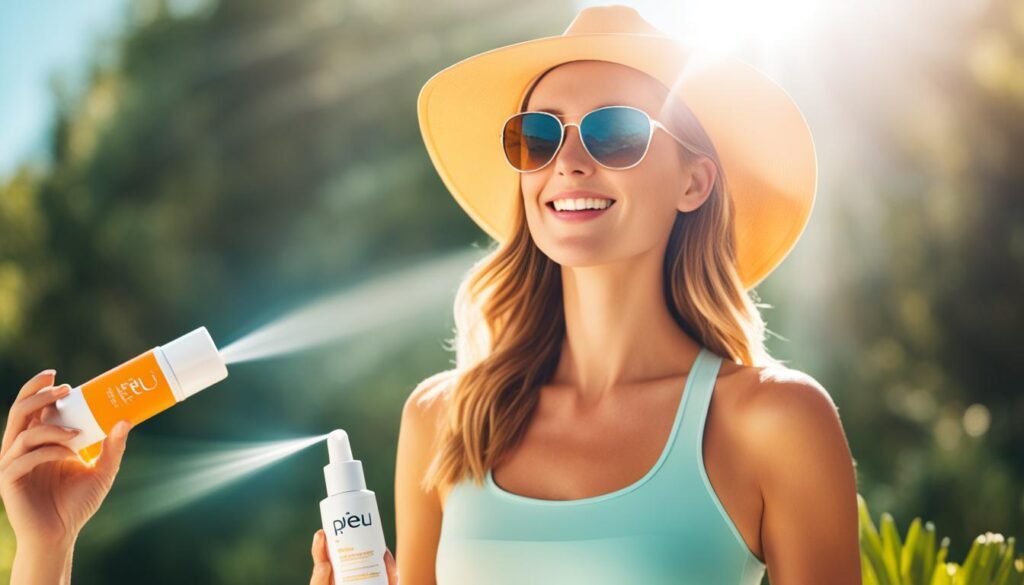
When it comes to skincare, finding the right sunscreen for oily and combination skin can be a challenge. Luckily, A’PIEU’s Super Air Fit Mild Sunscreen Daily is here to save the day. Specifically formulated for oily and combination skin types, this sunscreen offers SPF50+ PA++++ protection, ensuring your skin stays shielded from harmful UV rays.
One of the standout features of this sunscreen is its Super Air Fit technology, which provides a lightweight and non-sticky application. This means that even if you have oily skin, you won’t have to worry about that greasy feeling that often comes with sunscreen.
What sets A’PIEU’s Super Air Fit Mild Sunscreen Daily apart from other sunscreens is its powerful anti-aging ingredients. It contains asiaticoside, asiatic acid, and madecassoside, which not only create a barrier against external irritants but also offer anti-aging benefits. These ingredients help to firm and tighten the skin, reducing the appearance of fine lines and wrinkles.
For those with oily and combination skin, finding a sunscreen with a matte finish is crucial. A’PIEU’s Super Air Fit Mild Sunscreen Daily delivers on this front, providing a smooth and shine-free finish that won’t clog your pores or cause breakouts.
So, if you’re looking for the best sunscreen for oily and combination skin that offers both sun protection and anti-aging benefits, A’PIEU’s Super Air Fit Mild Sunscreen Daily is the perfect choice. With its lightweight formula, powerful ingredients, and matte finish, you can confidently step out into the sun knowing that your skin is protected and cared for.
Best Anti-Aging Primer with Sunscreen SPF
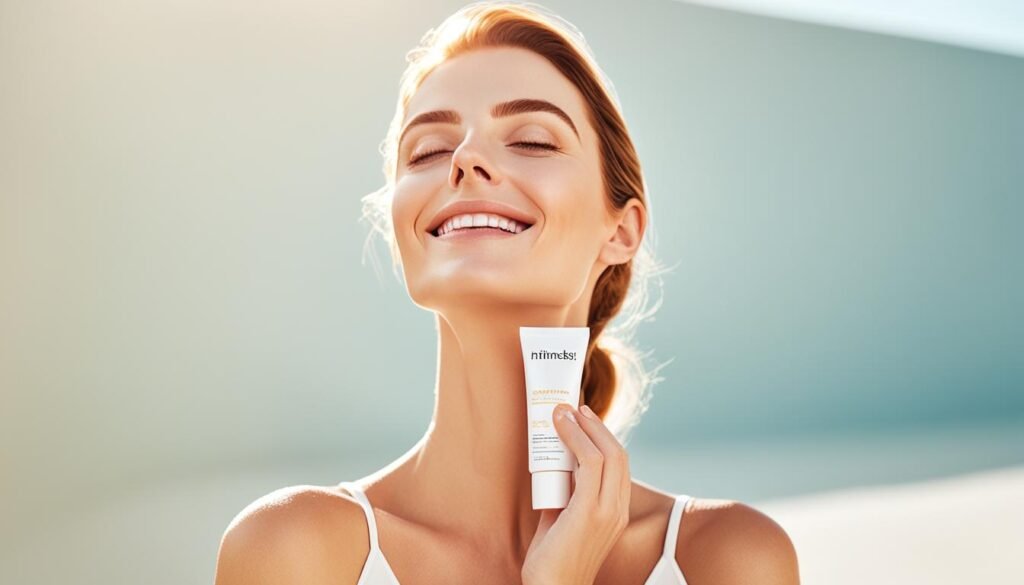
Heimish’s Artless Glow Base SPF 50+ PA+++ is a multi-purpose product that combines SPF protection, moisturization, and a makeup base in one. Its lightweight formula provides a luminous glow and serves as an excellent primer for makeup application. This glow base enhances your skin’s appearance while offering sun protection and anti-aging benefits.
With Heimish’s Artless Glow Base, you can achieve a radiant and youthful look while keeping your skin protected from harmful UV rays. This versatile product not only creates a smooth canvas for your makeup but also delivers essential hydration to your skin, making it perfect for those with dry or dehydrated skin. The lightweight formula absorbs quickly, leaving your skin feeling fresh and moisturized throughout the day.
One of the key features of Heimish’s Artless Glow Base is its ability to provide a luminous glow to your complexion. The lightweight formula contains light-reflecting particles that give your skin a natural radiance, making it look healthier and more youthful. Whether you wear it alone or under makeup, this glow base is sure to enhance your skin’s natural beauty.
In addition to the luminous glow it provides, Heimish’s Artless Glow Base offers SPF 50+ PA+++ protection, ensuring that your skin is shielded from the damaging effects of the sun’s rays. Sun exposure is one of the leading causes of premature aging, including wrinkles, fine lines, and dark spots. By incorporating this primer with sunscreen into your daily routine, you can protect your skin from sun damage and maintain a youthful appearance.
Heimish’s Artless Glow Base is not only a primer and sunscreen but also a moisturizer. It contains hydrating ingredients that help nourish and moisturize your skin, keeping it soft and supple. By moisturizing your skin while providing sun protection, this product helps to combat dryness and maintain a healthy moisture barrier.
Whether you’re preparing for a day at the office or a special event, Heimish’s Artless Glow Base SPF 50+ PA+++ is the perfect addition to your beauty routine. It combines the benefits of a primer, sunscreen, and moisturizer, giving you a luminous glow while protecting your skin from the sun’s harmful rays. Experience the transformative power of this all-in-one product and enjoy a flawless complexion with every use.
Conclusion
Incorporating anti-aging sunscreen into your skincare routine is vital for maintaining youthful and healthy-looking skin. By using a sunscreen with effective ingredients and a high SPF, you can protect your skin from sun damage, prevent premature aging, and minimize the appearance of wrinkles and fine lines.
Remember, sun protection is not only important during the summer months or when spending time outdoors. UV rays can penetrate clouds and windows, so it is crucial to wear sunscreen daily, regardless of the weather. By consistently applying sunscreen to all exposed areas, you can maintain youthful and radiant skin for years to come.
When choosing an anti-aging sunscreen, look for ingredients like zinc oxide and avobenzone for broad-spectrum protection, antioxidants to neutralize free radicals, and niacinamide for improved skin elasticity. Additionally, consider factors such as SPF value, your skin type, and personal preferences to find the best sunscreen that fits your needs.
Protecting your skin from the harmful effects of the sun is an investment in your skin’s health and appearance. Make sunscreen a non-negotiable part of your daily skincare routine to achieve and maintain youthful, glowing skin.
FAQ
What are some sunscreen ingredients that are beneficial for aging skin?
Zinc oxide, avobenzone, antioxidants, niacinamide, green tea extract, hyaluronic acid, alpha-lipoic acid, ceramides, and coenzyme Q10 are all sunscreen ingredients that provide sun protection and offer anti-aging benefits.
How do UV rays damage the skin?
UV rays, both UVA and UVB, can cause cellular damage to the skin. UVB rays primarily affect the top layer of the skin, leading to redness, roughness, and scaly patches known as actinic keratosis. UVA rays, on the other hand, can penetrate deeper into the skin, damaging the collagen and elastin fibers that give skin its firmness and elasticity.
Why is sunscreen important for aging skin?
Sunscreen is crucial for protecting aging skin from the harmful effects of the sun. Prolonged sun exposure can lead to hyperpigmentation, age spots, uneven skin tone, and even skin cancer. By wearing sunscreen daily, you can shield your skin from UV radiation, preventing future sun damage and preserving a more youthful appearance.
What are some key anti-aging ingredients in sunscreen?
Key anti-aging ingredients in sunscreen include zinc oxide and avobenzone for broad-spectrum protection, antioxidants to neutralize free radicals, niacinamide for improved skin elasticity, green tea extract for protection against environmental stressors, hyaluronic acid for hydration, alpha-lipoic acid for anti-inflammatory and antioxidant properties, ceramides for moisture retention, and coenzyme Q10 for reducing signs of aging.
What should I consider when choosing an anti-aging sunscreen?
When choosing an anti-aging sunscreen, consider the SPF value, with a recommendation of SPF 30 for daily use and SPF 50 for extended outdoor activities. Choose between chemical and mineral sunscreens based on skin type and preference, with mineral sunscreens being gentler on sensitive skin. Avoid sunscreens containing oxybenzone and octinoxate due to potential environmental harm and allergic reactions.
Who should use anti-aging sunscreen?
Anti-aging sunscreen is suitable for individuals of all ages, from mature adults who want to maintain skin elasticity and prevent further signs of aging to young adults who wish to delay signs of aging. It is also ideal for those with sensitive skin, as many anti-aging sunscreens contain soothing ingredients that protect without causing irritation.
What is the best anti-aging sunscreen for the face?
KAHI’s Wrinkle Bounce Essential Suncream is a top choice for an anti-aging sunscreen. It contains zinc oxide and titanium dioxide for broad-spectrum protection and niacinamide to improve skin elasticity. This cream-type sunscreen also replenishes nutrition and moisture, reducing the appearance of wrinkles and promoting a youthful complexion.
What is the best anti-aging sunscreen for sensitive skin?
The iUNIK Centella Calming Daily Sunscreen is perfect for sensitive skin. With an SPF of 50+ PA++++, it provides gentle sun protection while soothing the skin. It contains Centella Asiatica Extract, known for its anti-aging properties, and Beta-Glucan for hydration and calming effects, making it an excellent choice for maintaining a youthful complexion.
What is the best anti-aging sunscreen for oily and combination skin?
A’PIEU’s Super Air Fit Mild Sunscreen Daily is specifically formulated for oily and combination skin. It offers SPF50+ PA++++ protection and features Super Air Fit technology for a lightweight, non-sticky application. This sunscreen contains asiaticoside, asiatic acid, and madecassoside, which create a barrier against external irritants and offer anti-aging benefits. It is an ideal choice for those seeking sun protection with a matte finish.
What is the best anti-aging primer with sunscreen SPF?
Heimish’s Artless Glow Base SPF 50+ PA+++ is a multi-purpose product that combines SPF protection, moisturization, and a makeup base in one. Its lightweight formula provides a luminous glow and serves as an excellent primer for makeup application. This glow base enhances your skin’s appearance while offering sun protection and anti-aging benefits.

